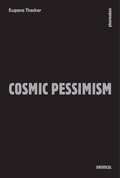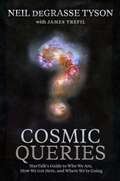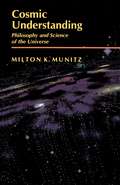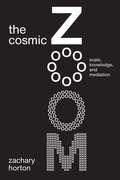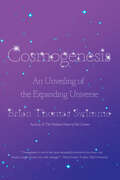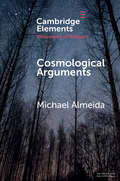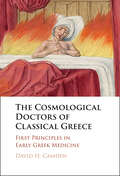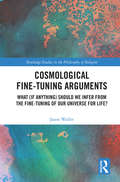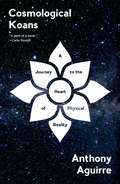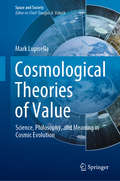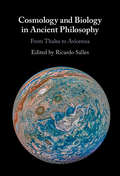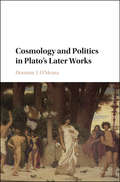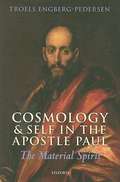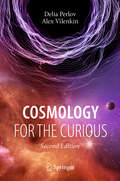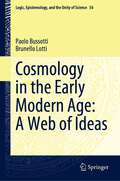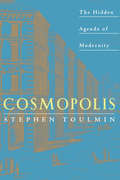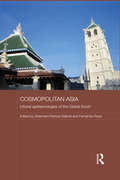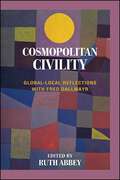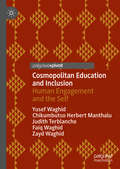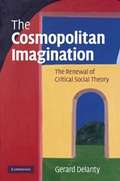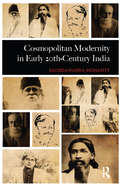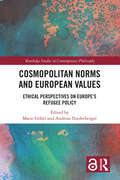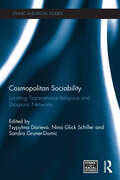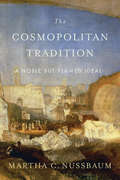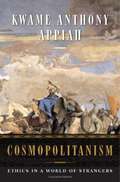- Table View
- List View
Cosmic Pessimism (Univocal)
by Eugene Thacker&“We&’re doomed.&” So begins the work of the philosopher whose unabashed and aphoristic indictments of the human condition have been cropping up recently in popular culture. Today we find ourselves in an increasingly inhospitable world that is, at the same time, starkly indifferent to our species-specific hopes, desires, and disappointments. In the Anthropocene, pessimism is felt everywhere but rarely given its proper place. Though pessimism may be, as Eugene Thacker says, the lowest form of philosophy, it may also contain an enigma central to understanding the horizon of the human. Written in a series of fragments, aphorisms, and prose poems, Thacker&’s Cosmic Pessimism explores the varieties of pessimism and its often-conflicted relation to philosophy. &“Crying, laughing, sleeping—what other responses are adequate to a life that is so indifferent?&”
Cosmic Queries: Startalk's Guide to Who We Are, How We Got Here, and Where We're Going
by Neil DeGrasse Tyson James Trefil"An exploration of some of the deepest questions about our place in the universe"
Cosmic Understanding: Philosophy and Science of the Universe
by Milton K. MunitzThe description for this book, Cosmic Understanding: Philosophy and Science of the Universe, will be forthcoming.
The Cosmic Zoom: Scale, Knowledge, and Mediation
by Zachary HortonIn The Powers of Ten by Charles and Ray Eames, a view of two people enjoying a picnic zooms up and away to show their surroundings, moving progressively farther into space, then zooms back in for a close-up of the hand of the picnicker, travelling deep into the microscopic realm. This is one of the most iconic examples of the “cosmic zoom,” a trope that has influenced countless media forms over the past seventy years. Horton uses the cosmic zoom as a starting point to develop a cross-disciplinary theory of scale as mediated difference. He considers the origins of our notions of scale, how scalar mediation functions differently in analog and digital modes, and how cosmic zoom media has influenced scientific and popular views of the world. Analyzing literature, film, digital media, and database history, Horton establishes a much-needed framework for thinking about scale across multiple domains and disciplines.
Cosmogenesis: An Unveiling of the Expanding Universe
by Brian Thomas SwimmeFrom the host and cocreator of PBS&’s Journey of the Universe, a fresh look at how the rich collision between science and spirituality has influenced contemporary consciousness The understanding that the universe has been expanding since its fiery beginning 14 billion years ago and has developed into stars, galaxies, life, and human consciousness is one of the most significant in human history. It is taught throughout the world and has become our common creation story for nearly every culture. In terms of the universe&’s development, we humans are not only economic, religious, or political beings. At the most fundamental level, we are cosmological beings. Cosmogenesis is one of the greatest discoveries in human history, and it continues to have a profound impact on humanity. And yet most science books do not explore the effects it has had on our individual minds. In Cosmogenesis, Brian Thomas Swimme narrates the same cosmological events that we agree are fact but offers a feature unlike all other writings on this topic. He tells the story of the universe while simultaneously telling the story of the storyteller. Swimme describes how the impact of this new story deconstructed his mind then reassembled it, offering us a glimpse into how cosmogenesis has transformed our understanding of both the universe and the evolution of human consciousness itself.
Cosmological Arguments (Elements in the Philosophy of Religion)
by Michael AlmeidaThe book discusses the structure, content, and evaluation of cosmological arguments. The introductory chapter investigates features essential to cosmological arguments. Traditionally, cosmological arguments are distinguished by their appeal to change, causation, contingency or objective becoming in the world. But none of these is in fact essential to the formulation of cosmological arguments. Chapters 1-3 present a critical discussion of traditional Thomistic, Kalam, and Leibnizian cosmological arguments, noting various advantages and disadvantages of these approaches. Chapter 4 offers an entirely new approach to the cosmological argument - the approach of theistic modal realism. The proper explananda of cosmological arguments on this approach is not change, causation, contingency or objective becoming in the world. The proper explananda is the totality of metaphysical reality - all actualia and all possibilia. The result is the most compelling and least objectionable version of the cosmological argument.
The Cosmological Doctors of Classical Greece: First Principles in Early Greek Medicine
by David H. CamdenWhy did some doctors in Classical Greece feel compelled to study the universe as a whole? How could cosmological principles be employed in clinical practice? This book explores the works of the cosmological doctors, such as On Breaths, On Flesh, and On Regimen, and argues that they form part of a much broader reorganization of medical knowledge in the fifth and fourth centuries BCE. These healers used cosmological principles as a supplement to, rather than a replacement of, more traditional approaches to health and disease, creating theories about the cosmos whose obscurities can best be understood as the products of medical thinking. Through fresh readings of many ancient sources, the book revises customary views of the intersections between medicine and cosmology in Classical Greece and advances our understanding of one of the most remarkable periods in the history of ancient thought.
Cosmological Fine-Tuning Arguments: What (if Anything) Should We Infer from the Fine-Tuning of Our Universe for Life? (Routledge Studies in the Philosophy of Religion)
by Jason WallerIf the physical constants, initial conditions, or laws of nature in our universe had been even slightly different, then the evolution of life would have been impossible. This observation has led many philosophers and scientists to ask the natural next question: why is our universe so "fine-tuned" for life? The debates around this question are wide-ranging, multi-disciplinary, complicated, technical, and (at times) heated. This study is a comprehensive investigation of these debates and the many metaphysical and epistemological questions raised by cosmological fine-tuning. Waller’s study reaches two significant and controversial conclusions. First, he concludes that the criticisms directed at the "multiverse hypothesis" by theists and at the "theistic hypothesis" by naturalists are largely unsuccessful. Neither of these options can plausibly be excluded. Choosing between them seems to turn on primitive (and so hard to justify) metaphysical intuitions. Second, in order to break the philosophical deadlock, Waller moves the debate from the level of universes to the level of possible worlds. Arguing that possible worlds are also "fine-tuned" in an important and interesting sense, Waller concludes that the only plausible explanation for the fine-tuning of the actual world is to posit the existence of some kind of "God-like-thing."
Cosmological Koans: A Journey To The Heart Of Physical Reality
by Anthony AguirreCosmological Koans invites the reader into an intellectual adventure of the highest order. Through more than fifty Koans—pleasingly paradoxical vignettes following the ancient Zen tradition—leading physicist Anthony Aguirre takes the reader across the world from West to East, and through ideas spanning the age, breadth, and depth of the Universe. Using these beguiling Koans (Could there be a civilization on a mote of dust? How much of your fate have you made? Who cleans the universe?) and a flair for explaining complex science, Aguirre covers cosmic questions that scientific giants from Aristotle to Galileo to Heisenberg have grappled with, from the meaning of quantum theory and the nature of time to the origin of multiple universes. A playful and enlightening book, Cosmological Koans explores the strange hinterland between the deep structure of the physical world and our personal experience of it, giving readers what Einstein himself called “the most beautiful and deepest experience” anyone can have: a sense of the mysterious.
Cosmological Theories of Value: Science, Philosophy, and Meaning in Cosmic Evolution (Space and Society)
by Mark LupisellaBuilding from foundations of modern science and cosmic evolution, as well as psychological and philosophical perspectives of value and meaning, this book explores some of humanity’s biggest questions: · Is the Universe “about something”? · What might be roles for life and intelligence in cosmic evolution? · How might we think about value, meaning, purpose, and ethics in a cosmic evolutionary context? The author explores how the sciences of relativity and quantum theory, combined with cosmic evolution and philosophical traditions such as process philosophy, contribute to the development of a broad “relationalist framework”. That framework helps inform perspectives such as “scientific minimalism” and “cosmological theories of value”. Cosmological Reverence, Cosmocultural Evolution, and the Connection-Action Principle are explored as examples of cosmological theories of value, all of which help inform how we might think about ethics, value, and meaning in a cosmic context – including application to the search for extraterrestrial life and the future of intelligence in the universe. This book will benefit a diverse range of practitioners in philosophy, science, and policy, including interdisciplinary fields such as Science and Society and cultural evolution studies. From the Foreword: “This volume ranges from the sciences of cosmic evolution, relativity, and quantum mechanics, to value theory and process philosophy, all with the goal of exploring how they relate to humanity in the sense of worldviews and meaning. With his three cosmological theories of value, Lupisella goes beyond the bounds of most books on naturalism, and into fundamental questions about the nature of the universe and our relation to it. To read Lupisella is to have a mind-boggling experience, to want to race to references, to want to know more.” Steven J. Dick Former Baruch S. Blumberg NASA/ Library of Congress Chair in Astrobiology Former NASA Chief Historian
Cosmology and Biology in Ancient Philosophy: From Thales to Avicenna
by Ricardo SallesIn antiquity living beings are inextricably linked to the cosmos as a whole. Ancient biology and cosmology depend upon one another and therefore a complete understanding of one requires a full account of the other. This volume addresses many philosophical issues that arise from this double relation. Does the cosmos have a soul of its own? Why? Is either of these two disciplines more basic than the other, or are they at the same explanatory level? What is the relationship between living things and the cosmos as a whole? If the cosmos is an animate intelligent being, what is the nature of its thoughts and actions? How do these relate to our own thoughts and actions? Do they pose a threat to our autonomy as subjects and agents? And what is the place of zoogony in cosmogony? A distinguished international team of contributors provides original essays discussing these questions.
Cosmology and Politics in Plato’s Later Works
by O’meara Dominic J.Knowledge of the structure of the cosmos, Plato suggests, is important in organizing a human community which aims at happiness. This book investigates this theme in Plato's later works, the Timaeus, Statesman, and Laws. Dominic J. O'Meara proposes fresh readings of these texts, starting from the religious festivals and technical and artistic skills in the context of which Plato elaborates his cosmological and political theories, for example the Greek architect's use of models as applied by Plato in describing the making of the world. O'Meara gives an account of the model of which Plato's world is an image; of the mathematics used in producing the world; and of the relation between the cosmic model and the political science and legislation involved in designing a model state in the Laws. Non-specialist scholars and students will be able to access and profit from the book.
Cosmology and Self in the Apostle Paul: The Material Spirit
by Troels Engberg-PedersenThis book attempts to synthesize what can be known of Paul's overall world-view, not least to be understood in concrete, cosmological terms, and to connect his world-view with his notion of self as this emerges in his accounts of his own conversion.
Cosmology for the Curious
by Delia Perlov Alex VilenkinThis book is a gentle introduction for all those wishing to learn about modern views of the cosmos. Our universe originated in a great explosion – the big bang. For nearly a century cosmologists have studied the aftermath of this explosion: how the universe expanded and cooled down, and how galaxies were gradually assembled by gravity. The nature of the bang itself has come into focus only relatively recently. It is the subject of the theory of cosmic inflation, which was developed in the last few decades and has led to a radically new global view of the universe. Students and other interested readers will find here a non-technical but conceptually rigorous account of modern cosmological ideas - describing what we know, and how we know it. One of the book's central themes is the scientific quest to find answers to the ultimate cosmic questions: Is the universe finite or infinite? Has it existed forever? If not, when and how did it come into being? Will it ever end? The book is based on the undergraduate course taught by Alex Vilenkin at Tufts University. It assumes no prior knowledge of physics or mathematics beyond elementary high school math. The necessary physics background is introduced as it is required. Each chapter includes a list of questions and exercises of varying degree of difficulty. This new edition includes hints for answering the questions and exercises, as well as extensions to the discussions on dark matter, quantum cosmology. A new chapter summarizing the standard cosmological model has also been added.
Cosmology in the Early Modern Age: A Web of Ideas (Logic, Epistemology, and the Unity of Science #56)
by Paolo Bussotti Brunello LottiThis volume addresses the history and epistemology of early modern cosmology. The authors reconstruct the development of cosmological ideas in the age of ‘scientific revolution’ from Copernicus to Leibniz, taking into account the growth of a unified celestial-and-terrestrial mechanics. The volume investigates how, in the rise of the new science, cosmology displayed deep and multifaceted interrelations between scientific notions (stemming from mechanics, mathematics, geometry, astronomy) and philosophical concepts. These were employed to frame a general picture of the universe, as well as to criticize and interpret scientific notions and observational data.This interdisciplinary work reconstructs a conceptual web pervaded by various intellectual attitudes and drives. It presents an historical–epistemological unified itinerary which includes Copernicus, Kepler, Galileo, Descartes, Huygens, Newton and Leibniz. For each of the scientists and philosophers, a presentation and commentary is made of their cosmological views, and where relevant, outlines of their most relevant physical concepts are given. Furthermore, the authors highlight the philosophical and epistemological implications of their scientific works. This work is helpful both as a synthetic overview of early modern cosmology, and an analytical exposition of the elements that were intertwined in early-modern cosmology. This book addresses historians, philosophers, and scientists and can also be used as a research source book by post-graduate students in epistemology, history of science and history of philosophy.
Cosmopolis: The Hidden Agenda of Modernity
by Stephen ToulminThis book chronicles a change of mind. When are we to think of the "modern" era as originating? What ideas or assumptions, about nature or society, have lain at the foundation of the "modern" program for human improvement? And how has the Western imagination come to outgrow these ideas and assumptions? Those are the central questions we need to tackle in this book.
Cosmopolitan Asia: Littoral Epistemologies of the Global South (Routledge Malaysian Studies Series)
by Sharmani Patricia Gabriel Fernando RosaOne key concept in the large body of scholarship concerned with theorizing social relations is the idea of 'cosmopolitanism'. This book unpacks the idea of cosmopolitanism through the linked knowledges of the Global South. It brings into dialogue an inter-disciplinary team of local and transnational scholars who examine various temporal, cultural, spatial and political contexts in countries as different, yet connected, as Malaysia, Indonesia, Singapore, India, Bangladesh, Japan, Korea and Vietnam. The book also considers a wide range of subjects – present and historical, real, as represented in literature and in theatre, and as theorized in philosophy – across these diverse contexts, but always focusing on regions and places where inter-Asian intermingling has taken place. The conclusions arrived at are varied and considerably enrich social theorizing. The book reveals a cosmopolitanism that is much more specifically Asian than the cosmopolitanism usually associated with the West, demonstrates how concepts of 'nation', 'local' and 'globalization' play out in practice in Asian settings, and re-examines concepts such as migration, diaspora, and the construction of identities. The book has much to offer scholars engaged in history, literary studies, anthropology and cultural studies.
Cosmopolitan Civility: Global-Local Reflections with Fred Dallmayr
by Ruth AbbeyProlific and pioneering, Fred Dallmayr has been an active scholar for over fifty years. His research interests include modern and contemporary political theory, hermeneutics, phenomenology, the Frankfurt School, continental political thought, democratic theory, multiculturalism, environmentalism, and cosmopolitanism. Dallmayr is also one of the founders of comparative political thought and his interest in non-Western political theory spans Chinese, Islamic, Indian, Buddhist, and Latin American traditions. In emulation of the vast interdisciplinary and international character of Dallmayr's work, this book draws upon senior and emerging scholars from an array of disciplines and countries, with essays that are philosophical (in the Western and non-Western traditions), cultural and/or political, and international. Dallmayr himself responds to the essays in a concluding chapter.
Cosmopolitan Education and Inclusion: Human Engagement and the Self
by Yusef Waghid Faiq Waghid Zayd Waghid Chikumbutso Herbert Manthalu Judith TerblancheThis book expands understanding of cosmopolitan education that has the potentialto cultivate deliberative pedagogical encounters in universities. The authorsargue that cosmopolitan education in itself is an act of engaging with strangeness,otherness, difference and inclusion/exclusion. What follows is the engenderingof inclusive human encounters in which freedom and rationality – guidedby co-operative, co-existential and oppositional acts of resistance – can be exercised.The chapters centre around the enactment of universal hospitality, unconditionalengagement, difference, intercultural learning, democratic justice andopenness to develop a robust and reflexive defence of cosmopolitan education.This book will appeal to scholars of cosmopolitan education as well as democraticand inclusive education.
The Cosmopolitan Imagination: The Renewal of Critical Social Theory
by Gerard DelantyGerard Delanty provides a comprehensive assessment of the idea of cosmopolitanism in social and political thought which links cosmopolitan theory with critical social theory. He argues that cosmopolitanism has a critical dimension which offers a solution to one of the weaknesses in the critical theory tradition: failure to respond to the challenges of globalization and intercultural communication. Critical cosmopolitanism, he proposes, is an approach that is not only relevant to social scientific analysis but also normatively grounded in a critical attitude. Delanty's argument for a critical, sociologically oriented cosmopolitanism aims to avoid, on the one hand, purely normative conceptions of cosmopolitanism and, on the other, approaches that reduce cosmopolitanism to the empirical expression of diversity. He attempts to take cosmopolitan theory beyond the largely Western context with which it has generally been associated, claiming that cosmopolitan analysis must now take into account non-Western expressions of cosmopolitanism.
Cosmopolitan Modernity in Early 20th-Century India
by Sachidananda MohantyThis book presents an alternative view of cosmopolitanism, citizenship and modernity in early 20th-century India through the multiple lenses of mysticism, travel, friendship, art, and politics.It makes a key intervention in the understanding of cosmopolitan modernity based on the lives and experiences of Rabindranath Tagore, Ananda Coomaraswamy, Sri Aurobindo, Mirra Alfassa, James Cousins, Paul Richard, Dilip Kumar Roy, and Taraknath Das. Using archival texts and photographs, Mohanty interrogates the ideas of tradition and modernity, the local and the global, and Self and the world as integral to the conception of a cosmopolitan world order. The volume will interest scholars and students of modern Indian history, comparative literature, cultural studies, Indian philosophy, and South Asian studies and the general reader.
Cosmopolitan Norms and European Values: Ethical Perspectives on Europe's Refugee Policy (Routledge Studies in Contemporary Philosophy)
by Marie Göbel Andreas NiederbergerThis volume offers a systematic philosophical analysis of the normative challenges facing European refugee policy, focusing on whether the response to it can be based on European values. By considering the refugee policy through the lens of European values, cosmopolitan norms and universal human rights, the contributions expose the weaknesses and limitations of existing regulations and make proposals on how to improve them. The EU is often seen as a cosmopolitan project. Europe is supposed to be a community of states that aspires to be guided by cosmopolitan norms. However, the idea of a cosmopolitan Europe has never been unanimously shared, and in recent years, it has come under increasing scrutiny, particularly with regard to the EU’s refugee policy. The guiding idea of this book is that a deeper philosophical understanding of the normative issues at stake can foster greater conceptual clarity and enrich political debates on the future of European refugee policy. The first part of the book revolves around the question of whether the rise in refugee numbers over the past decade has led to a crisis in the EU and, if so, how this crisis relates to or impacts European values. The second part traces the history of the discourse on “European values” and examines from a philosophical perspective how we can plausibly understand these values in terms of their moral grammar, their normative content and their implications for the behaviour of the EU and its member states. Finally, the third part puts forth recommendations for a feasible and normatively more compelling European refugee policy based on human rights, human dignity, justice and democratic self-determination as the decisive normative requirements. Cosmopolitan Norms and European Values: Ethical Perspectives on Europe’s Refugee Policy will be of interest to researchers and advanced students working in ethics, political philosophy, political science, social sciences and law.
Cosmopolitan Sociability: Locating Transnational Religious And Diasporic Networks (Ethnic And Racial Studies)
by Tsypylma Darieva Nina Glick Schiller Sandra Gruner-DomicThis book approaches the concept of cosmopolitan sociability as a cultural or territorial rootedness that facilitates a simultaneous openness to shared human emotions, experiences, and aspirations. Cosmopolitan Sociability critiques definitions of cosmopolitanism as a tolerance for cultural difference or a universalist morality that arise from contemporary experiences of mobility and globalization. Challenging these assumptions, the book explores the degree to which a 'cosmopolitan dimension' can be practised within particular religious communities, diasporic ties, or gendered migrant identities in different parts of the world. A wide variety of expert contributors offer rich ethnographic insights into the interplay of social interactions and cosmopolitan sociability. In this way the book contributes significantly to ethnic and migration studies, global anthropology, social theory, and religious and cultural studies. Cosmopolitan Sociability was originally published as a special issue of Ethnic and Racial Studies.
The Cosmopolitan Tradition: A Noble but Flawed Ideal
by Martha C. NussbaumThe cosmopolitan political tradition defines people not according to nationality, family, or class but as equally worthy citizens of the world. Martha Nussbaum pursues this “noble but flawed” vision, confronting its inherent tensions over material distribution, differential abilities, and the ideological conflicts inherent to pluralistic societies.
Cosmopolitanism: Ethics in a World of Strangers
by Kwame Anthony AppiahFrom Publishers Weekly In a world more interconnected than ever, the responsibilities and obligations we share remain matters of volatile debate. Weighing in on a discourse that includes both visions of "clashing civilizations" and often equally misguided cultural relativism, Ghana-born Princeton philosopher Appiah (In My Father's House) reclaims a tradition of creative exchange and imaginative engagement across lines of difference. This cosmopolitan ethic, which he traces from the Greek Cynics and through to the U.N.'s Universal Declaration of Human Rights, must inevitably balance universals with respect for particulars. This balance comes through "conversation," a term Appiah uses literally and metaphorically to signal the depth of encounters across national, religious and other forms of identity. At the same time, Appiah stresses conversation needn't involve consensus, since living together mostly entails just getting used to one another. Amid the good and bad of globalization, the author parses some basic cultural-philosophical beliefs-drawing frequent examples from his own far-flung multicultural family as well as from impersonal relationships of exchange and power-to focus due attention on widespread and unexamined assumptions about identity, difference and morality. A stimulating read, leavened by cheerful, fluid prose, the book will challenge fashionable theories of irreconcilable divides with a practical and pragmatic worldview that revels in difference and the adventure of a shared humanity. This is an excellent start to Norton's new Issues of Our Time series. (Jan.) Copyright © Reed Business Information
